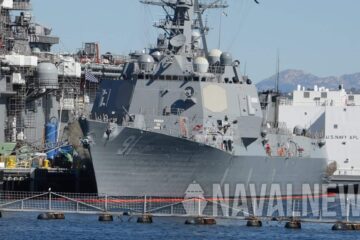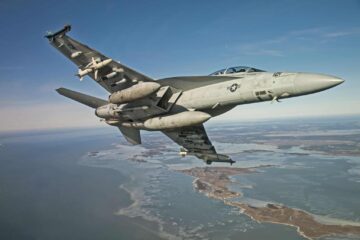NAVSEA press release
The future USS Minneapolis-Saint Paul is the 11th Freedom-variant LCS designed by the Lockheed Martin-led industry team at Fincantieri Marinette Marine, Marinette, Wisconsin. Delivery marks the official transfer of the ship from the shipbuilder, part of a Lockheed-Martin-led team to the Navy.
“Today marks a significant shipbuilding milestone in the life of the future USS Minneapolis-Saint Paul, an exceptional ship which will conduct operations around the globe,” said LCS program manager Capt. Mike Taylor. “I look forward to seeing Minneapolis-Saint Paul join her sister ships with 100 percent of propulsion power available for unrestricted use.”
LCS 21 was accepted after rigorous testing of a combining gear modification that will allow for unrestricted operations, addressing a class-wide flaw that was discovered as the Fleet deployed these ships in greater numbers. LCS 21 is the first Freedom-variant ship to receive the fix.
The future USS Minneapolis-Saint Paul is the second naval ship to honor Minnesota’s Twin Cities although each city has been honored twice before. The first US Navy warship named Minneapolis-Saint Paul was a Los Angeles-class submarine launched in 1983 who took part in Operation Desert Shield/Desert Storm. USS Minneapolis-Saint Paul (SSN 708) was the first submarine to carry Tomahawk missiles specifically designed for use in strikes against Iraq during the Gulf War. Having served for over two decades with distinction, the submarine Minneapolis-Saint Paul was decommissioned in 2007.
Several more Freedom variant ships are under construction at Fincantieri Marinette Marine Corp. in Marinette, Wisconsin. Pending successful at-sea testing of its combining gear modification, Cooperstown (LCS 23) is planned to deliver in January 2022. Additional ships in various stages of construction include Marinette (LCS 25), Nantucket (LCS 27), Beloit (LCS 29) and Cleveland (LCS 31).
The Littoral Combat Ship (LCS) is a fast, agile, mission-focused platform designed to operate in near-shore environments, winning against 21st-century coastal threats. The LCS is capable of supporting forward presence, maritime security, sea control, and deterrence.






